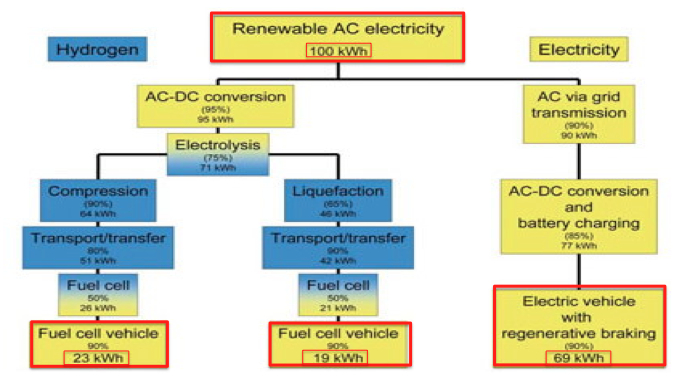Environment & Energy
Related: About this forumStanford engineers set record for capturing and storing solar energy in hydrogen fuel
http://news.stanford.edu/2016/10/31/stanford-engineers-set-record-capturing-storing-solar-energy-hydrogen-fuel/[font size=5]Stanford engineers set record for capturing and storing solar energy in hydrogen fuel[/font]
[font size=4]Stanford scientists used the electricity generated by high-efficiency solar cells to turn water into a chemical capable of storing 30 percent of the sun’s energy over long periods of time.[/font]
By Tom Abate
[font size=3]Solar energy has the potential to provide abundant power, but only if scientists solve two key issues: storing the energy for use at all hours, particularly at night, and making the technology more cost effective. Now an interdisciplinary team at Stanford has made significant strides toward solving the storage issue, demonstrating the most efficient means yet of storing electricity captured from sunlight in the form of chemical bonds. If the team can find a way of lowering the cost of their technology, they say it would be a huge step toward making solar power a viable alternative to current, more polluting energy sources.
The basic science behind the team’s approach is well understood: Use the electricity captured from sunlight to split water molecules into hydrogen and oxygen gas. That stored energy can be recovered later in different ways: by recombining the hydrogen and oxygen into water to release electricity again, or by burning the hydrogen gas in an internal combustion engine, similar to those running on petroleum products today.
Although the process is well understood, the challenge has been turning this science into an efficient industrial process. That’s where a team led by Thomas Jaramillo, an associate professor of chemical engineering and of photon science, and James Harris, a professor of electrical engineering, has made a significant improvement. In work published in Nature Communications, they were able to capture and store 30 percent of the energy captured from sunlight into stored hydrogen, beating the prior record of 24.4 percent.
“This milestone brings us much closer to a sustainable and practical process to use water-splitting as a storage technology,” Jaramillo said. “Improving efficiency has a remarkable impact on lowering costs. We have to continue work on finding more ways to lower the costs to compete with conventional fuels.”
…[/font][/font]
texasfiddler
(1,990 posts)Cicada
(4,533 posts)Trump would zero out this kind of research. This research will not only help fight global warming it will also produce tons of jobs.
NNadir
(33,541 posts)I'll add this to the list of what must be something on the order of 832,040 breathless "solar breakthroughs" I've heard about in my lifetime.
I'm an old man, and after a lifetime of hearing about solar energy and hydrogen "breakthroughs," and a long period in which I was ignorant enough to believe them, right now solar energy produces, worldwide, less than 2 of the 570 exajoules of energy produced and consumed by humanity each year.
99% of the hydrogen produced on this planet by humanity is made from the reformation of dangerous natural gas at a significant energy loss.
And still...and still...we're carrying on like solar (or wind) hydrogen matters.
It's depressing as hell, almost as depressing as having more than 5% of Americans willing to believe in that orange asshole as a serious candidate for President of the United States.
kristopher
(29,798 posts)
CentralMass
(15,265 posts)OKIsItJustMe
(19,938 posts)He really doesn’t care about any facts which contradict it.
For example, that costly compression step. That’s devastating! (Or is it?)
https://en.wikipedia.org/wiki/High-pressure_electrolysis
From Wikipedia, the free encyclopedia
[font size=3]High-pressure electrolysis (HPE) is the electrolysis of water by decomposition of water (H₂O) into oxygen (O₂ ) and hydrogen gas (H₂ ) due to the passing of an electric current through the water. The difference with a standard proton exchange membrane electrolyzer is the compressed hydrogen output around 12–20 megapascals (120–200 bar) at 70 °C. By pressurising the hydrogen in the electrolyser the need for an external hydrogen compressor is eliminated, the average energy consumption for internal differential pressure compression is around 3%.
…[/font][/font]
http://world.honda.com/automobile-technology/SmartHydrogenStation/power_creator.html
[font size=3]A vital component of the SHS is the Power Creator, which generates high-pressure hydrogen without using a compressor.
Of its wide-range of original technologies, Honda focused on its electrolysis stack that generates hydrogen by applying electricity to electrolyte film. This method is suited to compact hydrogen stations, and utilizes Honda’s own fuel cell stack technologies.
…
To compress generated hydrogen, Honda first experimented with normal pressure electrolysis with mechanical compressors. In proof-of-concept experiments using solar power, high efficiency in a compact hydrogen station could not be attained, due to mechanical compressor power loss, and low electrolysis efficiency.
In 2010, Honda developed the Power Creator, a high-differential-pressure electrolyzer. By using a unique high-differential-pressure electrolysis stack, it was now possible to generate high-pressure hydrogen without using mechanical compressors, and without the associated losses, hydrogen could be efficiently generated using less energy. Additionally, the lack of a mechanical compressor realizes a more compact design, and quiet operation.
…

…[/font][/font]
kristopher
(29,798 posts)Reality calling OKIsItJustMe;
Reality calling OKIsItJustMe....
And if we're going to quibble in that fashion we could challenge the 10% penalty on the AC via grid to either 7% (about max for long distance transmission) or to 0% for distributed on site renewables. Or we could point to the definitely non state-of-the-art 85% efficiency rating of AC-DC conversion and battery charging by pointing to solid evidence that puts that number well above 92%.
But the point is that the disparity between the amount of required carbon free generating infrastructure the two storage mediums is very, very, very large.
